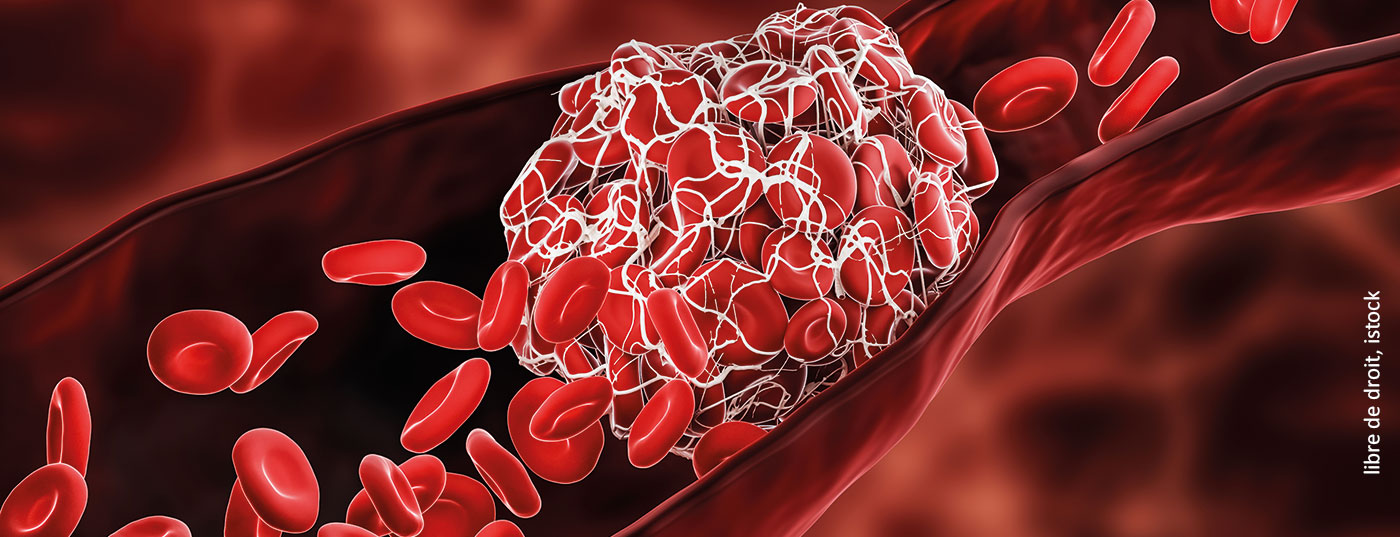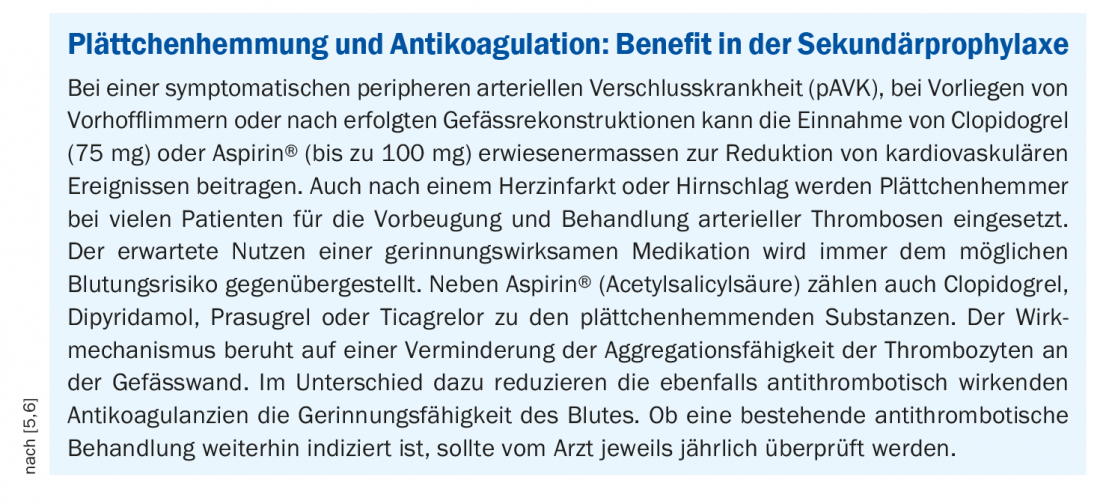Acetylsalicylic acid (ASA) has long been established for the secondary prevention of cardiovascular events. In contrast, ASA administration for primary prevention is controversial. While European experts tend to advise against it, U.S. professional societies see some value. But in any case, the use of ASA for primary prevention should be considered on an individual basis. Younger patients may be more likely to benefit, but special caution is needed in those over 60 years of age.
Family practice provides patients with low-threshold access for cardiovascular risk assessment and treatment. According to the current S3 guideline “GP risk advice for cardiovascular prevention”, the number of years of life lost due to coronary heart disease (CHD) in Germany is 13 years in men and 15 years in women [1]. Hypertension, diabetes, obesity, hypercholesterolemia, and smoking are among the most important modifiable risk factors for a cardiovascular event. The primary preventive benefit of effective treatment of these factors is undisputed. In contrast, the use of acetylsalicylic acid (ASA) for the prevention of a first cardiovascular event is increasingly criticized from a scientific point of view.
Evidence report based on 13 randomized clinical trials.
The current 2019 American College of Cardiology (ACC) and American Heart Association (AHA) recommendations advise primary prevention with ASA “in selected adults aged 40 to 70 years who are at increased risk of atherosclerotic disease but not at increased risk of bleeding” [2,3]. A new draft recommendation published in 2021. the U.S. Preventive Services Task Force (USPSTF) – an expert panel that advises the U.S. Department of Health and Human Services on disease prevention – comes to a somewhat different conclusion: taking acetylsalicylic acid (aspirin®) for the primary prevention of cardiovascular disease should be used in patients aged 40 to 59 In patients over 60 years of age, a new ASA prescription for this indication is not recommended. The basis for this assessment is an evidence report with data from more than 160 000 people whose average age ranged from 53 years in the Physicians’ Health Study to 74 years in the Aspirin in Reducing Events in the Elderly (ASPREE) [2,4].
Conclusion: individual assessment – age group plays a role
The research team, led by Janelle M. Guirguis-Blake, MD, of the Kaiser Permanente Evidence-based Practice Center in Portland, Oregon (USA), conducted a systematic review of the research literature and a meta-analysis of data from 13 randomized controlled trials with a total of 161 680 participants to assess the efficacy of aspirin® for the primary prevention of cardiovascular disease. They found that low-dose aspirin® somewhat reduced the risk of serious cardiovascular events, myocardial infarctions, and ischemic strokes (Peto Odds Ratio* 0.90, 0.89, and 0.82, respectively), while no differences were found in mortality due to cardiovascular disease and all-cause mortality. In the studies, absolute risk reductions for major cardiovascular events ranged from 0.08-2.5%. Low-dose aspirin® was associated with an increased risk of intracranial and extracranial hemorrhage (Peto odds ratios 1.31 and 1.53, respectively). Absolute risk increases ranged from -0.2-0.4% for intracranial and 0.2-0.9% for extracranial hemorrhage.
* Peto Odds Ratio: Statistical parameter that averages and weights the odds ratios of several studies in the context of meta-analyses.
Therefore, from the age of 60 ASA is no longer recommended for the primary prevention of heart attacks & Co. The risks from bleeding could be greater than any possible minor protection from cardiovascular disease. The USPSTF’s draft recommendation has been published online and is available at this web link.
Literature:
- S3 Guideline: Family Physician Risk Counseling for Cardiovascular Prevention, AWMF Registry No. 053-024, https://www.awmf.org, (last accessed Jan. 03, 2022)
- “Cardiovascular Disease: U.S. Experts Want to Limit ASA in Primary Prevention,” www.aerzteblatt.de/nachrichten/128154/Herz-Kreislauf-Erkrankungen-US-Experten-wollen-ASS-in-der-
- Primaerpraevention-einschraenken, 13.10.2021
- Arnett DK, et al: 2019 ACC/AHA Guideline on the Primary Prevention of Cardiovascular Disease: A Report of the American College of Cardiology/American Heart Association Task Force on Clinical Practice Guidelines, Circulation 2019, 140 (11), www.ahajournals (last accessed Jan 03, 2022).
- “Draft Recommendation Statement : Aspirin Use to Prevent Cardiovascular Disease: Preventive Medication,” https://uspreventiveservicestaskforce.org/uspstf/draft-recommendation/aspirin-use-to-prevent-cardiovascular-disease-preventive-medication, (last accessed Jan. 03, 2022).
- Rosenberg Y, et al: Recommendations for conservative therapy and secondary prevention of peripheral arterial disease (PAVD): an evidence-based information booklet for affected individuals, Vascular Surgery, published online Dec 23, 2021, https://doi.org/10.1007/s00772-021-00855-0
- Anticoagulation (blood thinning), www.swissheart.ch/de/herzkrankheiten-hirnschlag/behandlungen/behandlungen/gerinnungshemmung-blutverduennung.html (last accessed Jan. 03, 2022).
HAUSARZT PRAXIS 2022; 17(2): 22
CARDIOVASC 2022; 21(1): 21












